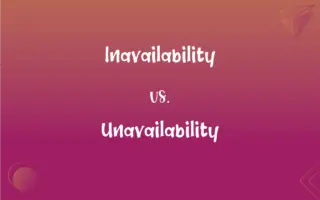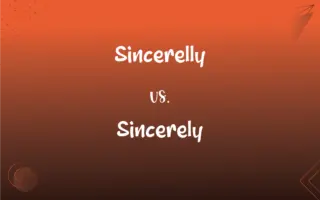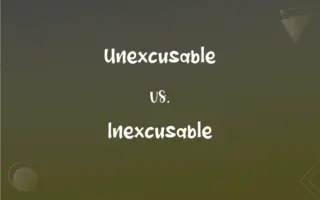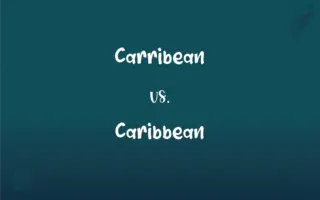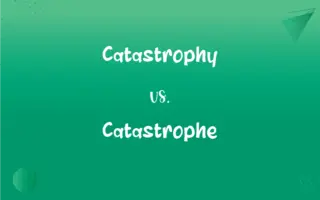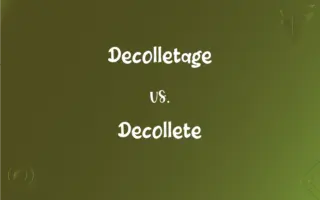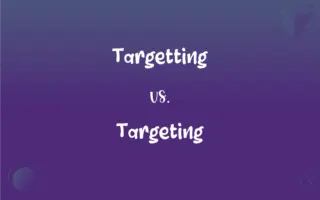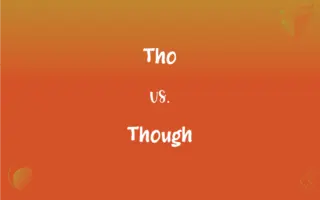Couse vs. Cause: Mastering the Correct Spelling
Edited by Janet White || By Harlon Moss || Updated on March 8, 2024
"Couse" is incorrect spelling, while "cause" is correct spelling. "Cause" refers to a person or thing that gives rise to an action, phenomenon, or condition.

Which is correct: Couse or Cause
How to spell Cause?

Couse is Incorrect

Cause is Correct
ADVERTISEMENT
Key Differences
Note that "cause" has the same vowel pattern as "clause," differing only in the first consonant.
Recall that "cause" rhymes with "pause," both ending in "-ause."
Link "cause" with "because," as both share the "cause" spelling.
Remember that "cause" contains "use," which is another correctly spelled word.
Think of "cause" as the root of "causation," helping to remember the "a-u-s-e" sequence.
ADVERTISEMENT
Correct usage of Cause
What was the couse of the accident?
What was the cause of the accident?
The project failed because of an unforeseen couse.
The project failed because of an unforeseen cause.
She believes in fighting for a noble couse.
She believes in fighting for a noble cause.
He quit his job for personal couse.
He quit his job for personal cause.
He wanted to donate money for a good couse.
He wanted to donate money for a good cause.
Cause Definitions
Cause refers to something that brings about an effect or result.
Pollution is a major cause of environmental degradation.
A cause can be a principle or movement that people are passionate about.
She dedicated her life to the cause of human rights.
In science, a cause is a factor that contributes to a phenomenon.
Researchers identified the primary cause of the disease.
A cause is a reason or motive for an action.
The cause of the accident was determined to be reckless driving.
In legal terms, cause is a reason sufficient to justify an action.
The judge found just cause for the lawsuit.
Because.
The producer of an effect, result, or consequence.
The one, such as a person, event, or condition, that is responsible for an action or result.
Cause Sentences
Every effect has a cause.
She studies the cause of natural disasters as part of her science project.
Understanding the cause of pollution is essential to finding a solution.
The cause of the fire was found to be a faulty wire.
The charity event was organized for a noble cause.
Awareness was raised for the cause of animal rights.
They are raising money for a good cause.
The debate focused on the main cause of the economic crisis.
She campaigned for the cause of women's rights.
The cause of the power outage was a downed tree.
The detective searched for the cause of the crime.
They fought tirelessly for the cause of freedom.
The doctor explained the cause of the illness.
He joined the movement because he believed in its cause.
He explained the cause of the economic downturn.
The seminar aims to educate people about the cause of climate change.
The cause of his sadness was unknown.
She dedicated her life to the cause of education.
The protest was for a cause they believed in deeply.
The book discusses the cause of the Civil War.
The study aims to identify the cause of the disease.
The cause of the delay was bad weather.
Finding the cause of the problem took hours.
Volunteers gathered to support the cause of the homeless.
The fundraiser supports the cause of providing clean water.
Cause Idioms & Phrases
Champion a cause
To support, defend, or fight for a cause.
She decided to champion the cause of environmental protection.
Cause for celebration
A reason to be happy or celebrate.
Passing the final exam was a cause for celebration for the whole class.
A good cause
A charitable or worthy effort or organization.
They organized a bake sale for a good cause.
Lost cause
A hopeless situation or case that cannot be won or changed.
Despite the team's efforts, the game seemed like a lost cause.
Cause for concern
A reason to worry.
The test results were a cause for concern for the patient.
Have cause to
To have a reason or justification to do something.
They had cause to celebrate after receiving the grant.
Without cause
Without a reason or justification.
The decision to cancel the project was made without cause.
Make common cause with
To unite with others for a shared purpose.
Different communities made common cause to demand policy changes.
Cause and effect
The principle that actions or events cause corresponding reactions or results.
The science project demonstrated cause and effect with simple experiments.
Rally for a cause
To gather support for a cause.
The community rallied for the cause of the local hospital.
Fight for a cause
To struggle or campaign for a particular purpose or belief.
Many volunteers joined to fight for the cause of ending hunger.
Take up a cause
To begin to support or advocate for a cause.
After witnessing the devastation, he took up the cause of disaster relief.
Cause a stir
To create excitement or controversy.
The new policy caused a stir among the employees.
In the cause of
In support of or for the sake of.
They worked long hours in the cause of completing the project on time.
Support a cause
To back or aid a cause.
They held a concert to support the cause of disaster relief.
Dedicate oneself to a cause
To commit oneself to supporting or advocating for a cause.
He dedicated himself to the cause of animal rescue.
A cause for alarm
A situation that warrants concern or worry.
The rising water levels were a cause for alarm among the residents.
Stand for a cause
To represent or advocate for a cause.
The politician stood for the cause of educational reform.
A lost cause
An effort or cause that has no chance of success.
Trying to fix the old car seemed like a lost cause.
Give cause for
To provide a reason for something.
The unexpected test scores gave cause for a review of the teaching methods.
FAQs
What is the verb form of cause?
The verb form of "cause" is also "cause," as in to bring about or give rise to.
Which vowel is used before cause?
The vowel "a" is used before "cause."
Why is it called cause?
It is called "cause" as it denotes the reason or factor that provokes or produces an effect.
What is the plural form of cause?
The plural form is "causes."
Which preposition is used with cause?
Prepositions like "of," "for," and "by" are commonly used with "cause."
What is the pronunciation of cause?
Cause is pronounced as "kawz" (/kɔːz/).
Which conjunction is used with cause?
Conjunctions like "and" and "or" can be used with "cause."
Which article is used with cause?
Both "a" and "the" can be used with "cause," depending on the context.
Is cause a noun or adjective?
"Cause" is primarily a noun, but can also be used as a verb.
What is the root word of cause?
The root word of "cause" is the Latin "causa," meaning "reason, motive."
What is the singular form of cause?
The singular form is "cause."
Is the cause term a metaphor?
The term "cause" can be used metaphorically in certain contexts.
Is the word cause imperative?
"Cause" can be used in the imperative form in commands, like "Cause no harm."
How many syllables are in cause?
There is one syllable in "cause."
What is the second form of cause?
The second form is "caused."
What is a stressed syllable in cause?
The entire word "cause" is stressed, as it is a single syllable.
What part of speech is cause?
"Cause" is a noun and can also be used as a verb.
Which determiner is used with cause?
Determiners like "this," "that," "a," or "the" can be used with "cause."
What is the third form of cause?
The third form is "caused."
Is cause a negative or positive word?
"Cause" is neutral; it can have either negative or positive connotations based on the context.
Is cause a countable noun?
Yes, "cause" is a countable noun.
What is the first form of cause?
The first form is "cause."
Is cause an adverb?
No, "cause" is not an adverb.
Is cause an abstract noun?
"Cause" can be considered an abstract noun in many of its uses.
Is cause a vowel or consonant?
"Cause" is a word, not a vowel or consonant.
How do we divide cause into syllables?
"Cause" is a single-syllable word, so it is not divided.
What is another term for cause?
Another term for "cause" is "reason" or "source."
How is cause used in a sentence?
"The investigation focused on finding the primary cause of the fire."
Is cause a collective noun?
"Cause" is not typically used as a collective noun.
What is the opposite of cause?
The opposite of "cause" could be "effect" or "consequence."
About Author
Written by
Harlon MossHarlon is a seasoned quality moderator and accomplished content writer for Difference Wiki. An alumnus of the prestigious University of California, he earned his degree in Computer Science. Leveraging his academic background, Harlon brings a meticulous and informed perspective to his work, ensuring content accuracy and excellence.
Edited by
Janet WhiteJanet White has been an esteemed writer and blogger for Difference Wiki. Holding a Master's degree in Science and Medical Journalism from the prestigious Boston University, she has consistently demonstrated her expertise and passion for her field. When she's not immersed in her work, Janet relishes her time exercising, delving into a good book, and cherishing moments with friends and family.




